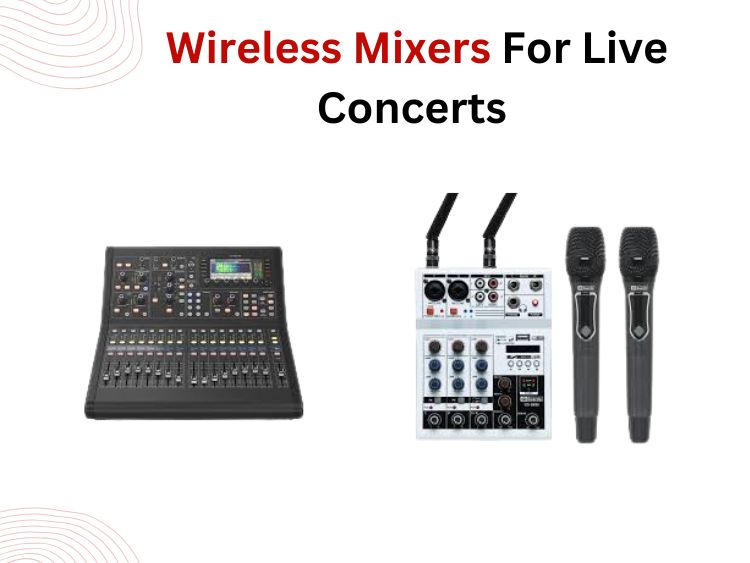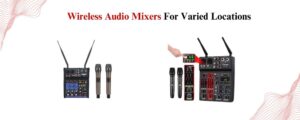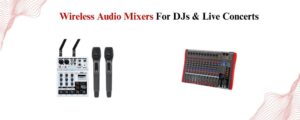In the rapidly developing industry of live sound, the introduction of wireless mixers is revolutionizing technology. They were once regarded as an extravagance exclusive to certain productions, but are now being seen at an increasing number of concerts, small gigs, corporate events, and across places of worship. The overriding question still exists: Do wireless mixers actually make a difference for live performances?
Let’s assess the features they offer, gauge them against traditional options, and determine if they will suit your needs for the next show. Are you sure about the feature to watch in modern-day mixers? Read: Top Features to Look for in a Live Sound Mixer.
The Big Advantages of Wireless Mixers
Mix from Anyplace in The Venue
Other than its obvious advantages, a wireless mixer gives you the freedom to walk around the room freely and listen to the audience’s perspective. You can now stand in the middle of the crowd or even backstage and still make EQ changes or volume changes instead of being stuck in front of house position.
This is especially helpful in:
- Outdoor shows with ever changing acoustics
- Small venues that do not have designated front of house positions
- Churches or conference rooms where the engineer is also the performer
Easily Maintainable, Clean Setup
Usually, physical mixers are coupled with racks, cables, and other equipment. Wireless mixers reduce most of this clutter.
- With less wires, setup and takedown are faster.
- Small units can be placed under the rack or on stage.
- Apps with drag-and-drop features offer intuitive setup options.
This streamlined setup is perfect for mobile performers, solo musicians, and sound professionals working back-to-back gigs in a single day.
Several Users Simultaneously
Multi-user control is supported in most wireless mixers. This means –
- Musicians can adjust their monitor mixes from their mobile devices.
- Responsibility can be divided among engineers – one stays at FOH, another at monitors.
- Band members can make minor changes to in-ear monitors or EQs without disrupting the overall mix.
- Delegating control makes performers less dependent on the main sound tech.
Want to buy 12 Channel DJ Equipment? Check the price of top-performing 5 Core Audio Mixer 12 Channel DJ Equipment with Bluetooth USB Console Sound Board.
Compact Size, Great Feature Sets
Don’t let the size fool you – wireless mixers are powerful. Many models provide the following:
- Digital effects like reverb, delay, or chorus.
- Parametric EQs and every channel comes with a compressor.
- Multitrack recording through USB, along with scene recall, mute groups, and more.
- Integrated Wi-Fi router.
Independent artists and small venues benefit greatly from 5 Core’s wireless digital mixers, renowned for their professional-grade features at competitive prices.
Drawbacks You Should Think About
Wireless mixers do present difficulties, challenges, or issues to overcome just like everything else.
Wi-Fi Dependability
What is the top concern? The stability of the network. Connection issues such as latency and dropouts can occur in busy environments with many wireless devices.
Avoidable tips include:
- Offer strong signal through a dedicated external router
- Update the mixer firmware and app regularly
- Transition to 5 GHz used band if supported (less congested than 2.4GHz)
Missing Physical Faders
For some engineers the feel of actual faders and knobs cannot be replicated. During fast-paced or low-light situations, touch interfaces may be less intuitive even though they are responsive.
People are able to adapt quickly to the interface and consider it more precise and adaptable.
Learning Trust
With a background using analog boards, digital signal routing, and app-based control will have a learning trust. Once learned, the majority of users appreciate the increased efficiency and flexibility offered by wireless mixers.
Who Should Consider a Wireless Mixer?
Wireless mixer applications are ideal for:
- Need quick & reliable setups for performing bands
- Small spaces such as churches and schools where volunteers manage sound
- One-person acts and duos desiring effortless onstage control
- Mobile AV technicians and DJs who require portable equipment
Traditional mixers are likely favored for more advanced large-scale productions requiring extensive routing, I/O super multi di ports, or analog integration. Even so, there’s a growing trend of hybrid alternatives offering wired and remote access controls.
Conclusion
Absolutely—when flexibility, efficiency, and mobility are priorities.
Over the years, wireless mixers have spectacularly evolved into powerful and professional tools for musicians, playing a 10-piece symphony in a basement, managing a multi-console conference, or doing sound for a worship service. A wireless mixer can streamline your workflow and enhance your audio mix. To find the best quality audio mixers, check the best collection of 5 Core audio mixers.
5 Core and other brands are pioneering and embracing changes for the lower cost, offering solutions that meet professional standards with live sound innovation in 2025.
If you are looking to work at a faster pace, think spatially while mixing, feel free to eliminate cables of all kinds that are troublesome wires—you know what to get, it is all worth the while.



